Success in sales isn’t just about talent—it’s about using the right tools. Every minute wasted on admin tasks or disorganized processes is time your team could spend closing deals. That’s where sales management software makes all the difference.
Whether you're a sales rep, sales manager, or business owner, the right software can help you stay organized, manage leads efficiently, and improve team collaboration. With so many options available, finding the right fit can be overwhelming. To help, we’ve curated a list of the 10 best sales management software for 2025, tailored to boost productivity, streamline workflows, and drive results. Let’s explore the top solutions for your sales teams.
What is sales management?
Sales management is about organizing and guiding a company's sales team to reach common goals. It involves creating and carrying out plans to help the team meet or exceed sales targets.
While each organization may have different goals, sales management usually focuses on increasing growth, making profits, and boosting sales volume.
What is sales management software and why is it important?
Sales management software refers to platforms designed to help businesses manage their sales processes, from generating leads to closing deals. Similar to CRM (Customer Relationship Management) software, these tools often include features like pipeline tracking, automation, collaboration tools, and analytics.
The sales world has become increasingly digital, with businesses needing to manage complex pipelines, analyze data, and collaborate effectively—all while keeping customer relationships at the forefront. By adopting the right sales management tools, businesses can streamline operations, close deals faster, and stay ahead of their competition.
Benefits of using sales management software
Sales management software offers a wide range of benefits. For sales managers, reps, and those involved in sales, it streamlines processes and improves overall performance. Here are some key advantages:
Enhanced productivity
Sales management software automates time-consuming tasks like lead tracking and follow-ups, allowing sales reps to focus on selling and closing deals, boosting overall productivity.
Stronger customer relationships
According to 82% of sales professionals, building relationships and connecting with people is the most critical aspect of selling. By centralizing customer data, sales management software enables sales teams to deliver more personalized communication, helping build stronger, long-term relationships with clients.
Data-driven insights
Sales analytics provide valuable insights into performance and trends, empowering teams to make informed decisions, set smarter goals, and adjust strategies for better results.
Improved collaboration
The software breaks down silos by offering shared dashboards and communication tools, allowing teams to work more cohesively and align efforts, improving teamwork and efficiency.
By utilizing sales management tools, businesses can increase efficiency, enhance customer relationships, and ultimately drive profitability.
Who uses sales management software
Sales management software is designed to keep your entire sales team organized, focused, and up-to-date. Despite its name, it benefits everyone, not just senior sales personnel.
Individual sales representatives: Sales reps utilize this software to enhance their productivity and streamline their daily tasks. They can track customer interactions, manage leads, and use integrated email and calling features to maintain efficient inbound and outbound sales efforts.
Sales managers: Team leaders leverage sales management tools to gain insights into their team’s performance and productivity. This software allows sales managers to monitor key sales metrics and KPIs, enabling informed adjustments to sales strategies.
Sales directors and executives: For higher-level executives, data is paramount. Sales management software provides robust reporting capabilities that assist in forecasting earnings, setting organizational goals, and identifying new opportunities and market trends.
Industries that benefit from sales management software
Sales management software is versatile and applicable across various industries. Here are some examples of how different sectors utilize it:
Small and Medium Businesses (SMBs): For SMBs, delivering exceptional service is crucial. Sales management software provides insights and workflows that help these businesses highlight their value to customers without competing solely on price. It also serves as a central hub for managing customer relationships, including support and post-sale communication.
SaaS: Software companies, especially those in the SaaS sector, require real-time data on sales metrics like churn rates. They need tools to manage leads throughout the sales funnel and maintain strong customer relationships.
E-commerce: In an increasingly crowded online marketplace, e-commerce businesses must stay organized and proactive to engage customers and encourage repeat purchases. Sales management software enables these companies to automate their sales funnels, nurture high-value leads, and analyze trends for customer retention.
Real estate: For real estate professionals, where purchases are often significant and infrequent, building strong relationships is essential. Sales management software aids in project management and ensures that agents remain top-of-mind for clients throughout the buying process.
Coaching and consulting: For those in coaching and consulting, managing numerous clients is vital. Sales management software, including CRM features, helps organize client information and communications while automating scheduling tasks to reduce administrative burdens.
What to look for in sales management software
When selecting sales management software, it’s important to consider features that align with your team’s needs. Here are the key elements to evaluate:
Lead and pipeline management
Look for software that offers lead-tracking capabilities. This allows you to monitor how leads progress through your sales pipeline, helping you identify where to focus your efforts. It ensures that no potential opportunities are overlooked and helps streamline your sales process.
Sales analytics and reporting
A robust analytics feature provides valuable insights into your sales performance. This includes understanding revenue forecasts and team productivity. By having access to clear reports, you can make informed, data-driven decisions that enhance your sales strategy.
Automation features
Efficiency is critical in sales. Automation tools can handle repetitive tasks, such as sending follow-up emails, setting reminders, and entering data. By automating these processes, your team can focus more on building relationships and closing deals.
Team collaboration tools
Effective communication is vital for a successful sales team. Look for software that includes shared dashboards, messaging options, and task management features. These tools facilitate teamwork, ensuring everyone is on the same page and working towards common goals.
Integration capabilities
Your sales management software should seamlessly integrate with existing tools you use, such as CRM systems, email platforms, and marketing automation tools. This connectivity enhances workflow efficiency and reduces the need for manual data transfer.
Scalability
Choose a solution that can grow with your business. Whether you’re a small startup or planning to expand into new markets, the software should adapt to your changing needs without requiring a complete overhaul.
Ease of use
Finally, the software should be user-friendly. It should be easy to set up and navigate, allowing your team to get started quickly. Check if it offers guides or free templates to help you kickstart your sales workflow effectively.
To help you get started, Lark’s template library contains hundreds of sales-related templates that are free to use. Try out this Sales Management System template, ideal for streamlining your sales process.
The best sales management software at a glance
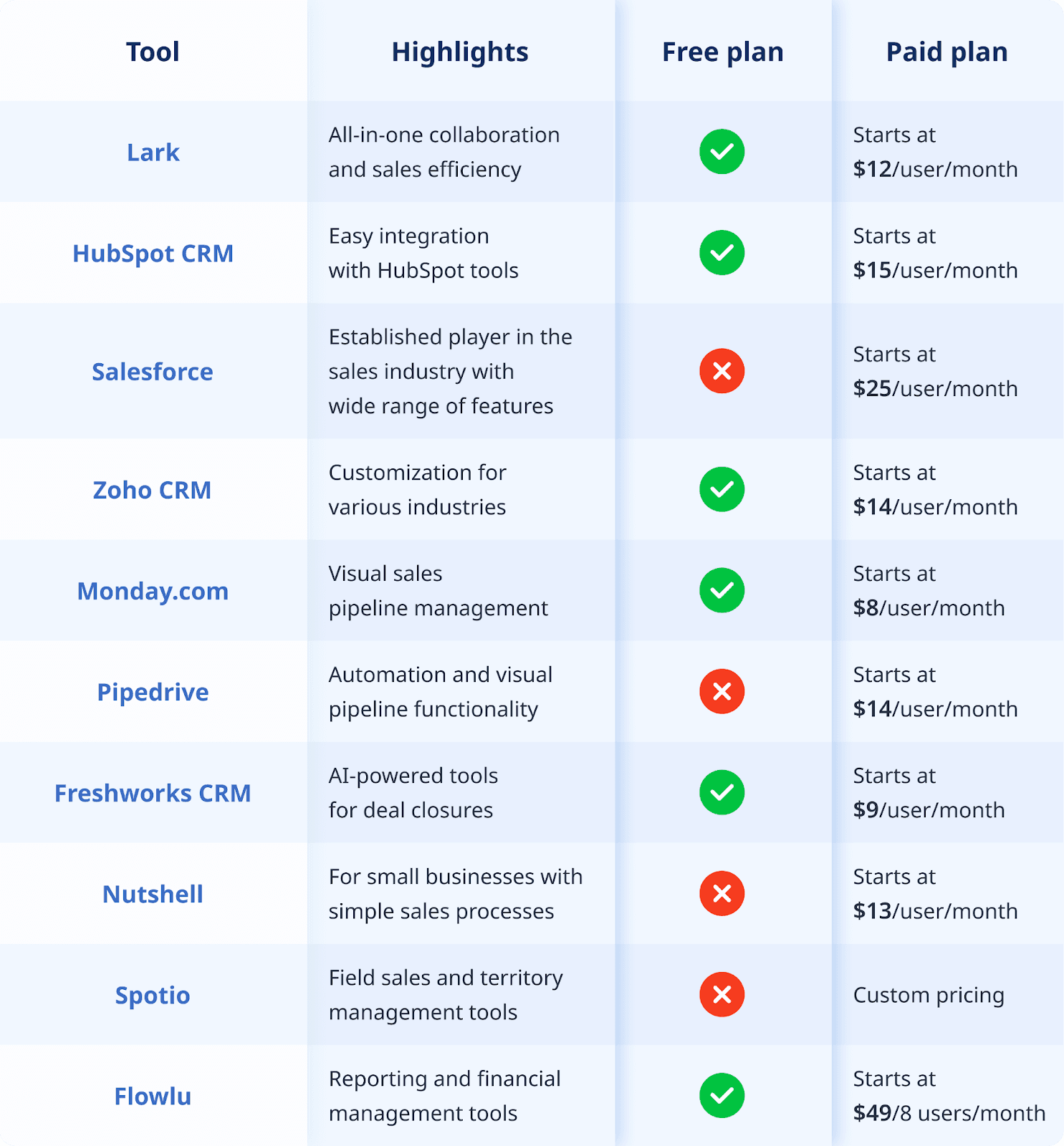
The 10 best sales management software in 2025
Here’s a detailed look at the best sales management tools available in 2025, tailored to meet the needs of diverse sales teams:
1. Lark - Best for teams of all sizes needing collaboration and sales management
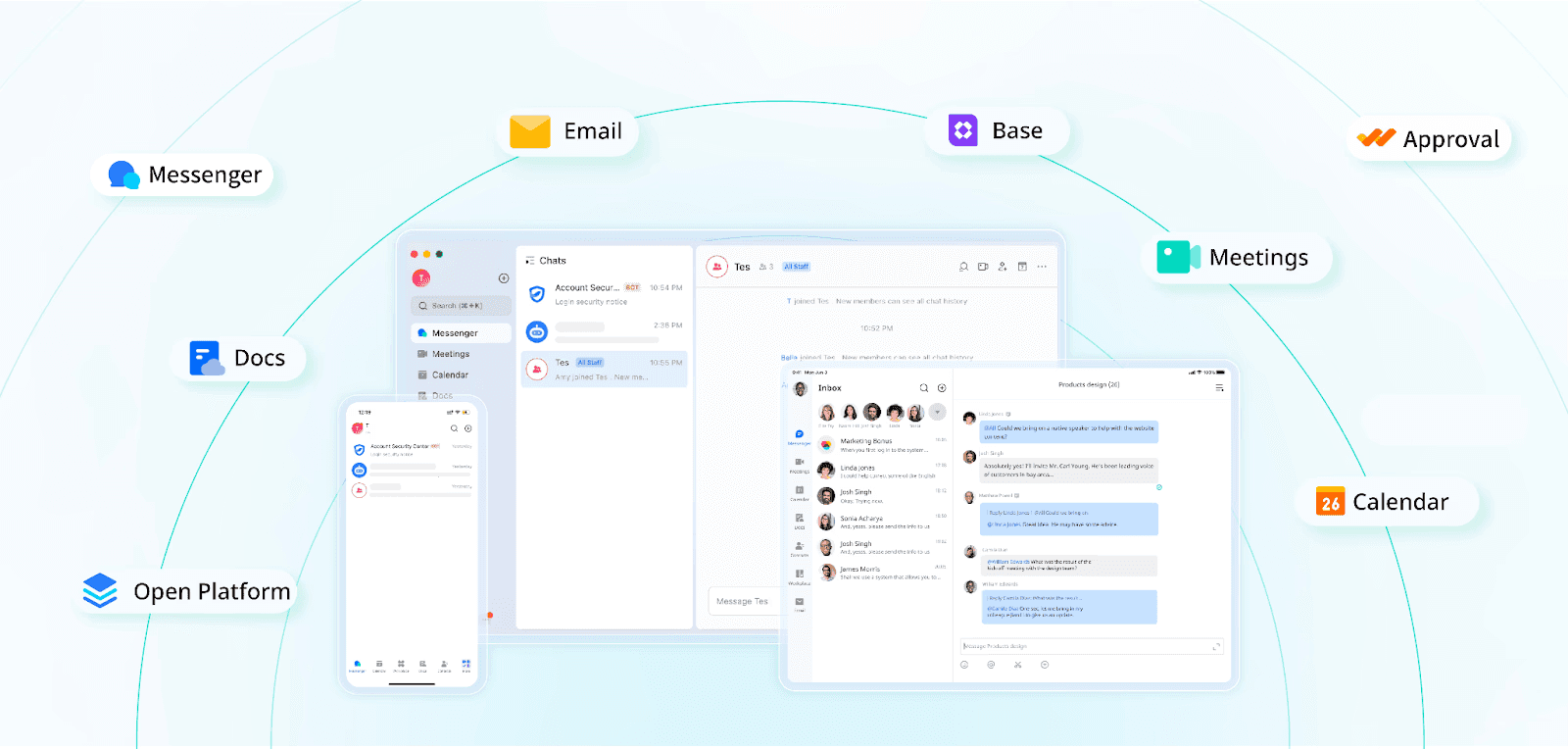
Lark is an all-in-one collaboration and management platform that seamlessly combines tools like instant messaging, calendaring, cloud documents, and video conferencing. It’s designed to enhance collaboration and communication across sales teams, enabling improved efficiency and streamlined sales management.
It supports use across multiple devices—including computers, mobile phones, and tablets—making it an ideal solution for both in-office and frontline salespeople who need to collaborate anytime, anywhere.
Key features:
Lark offers innovative solutions for sales management software through its data management feature, Lark Base, which provides flexible tools for building lightweight, customizable business systems.
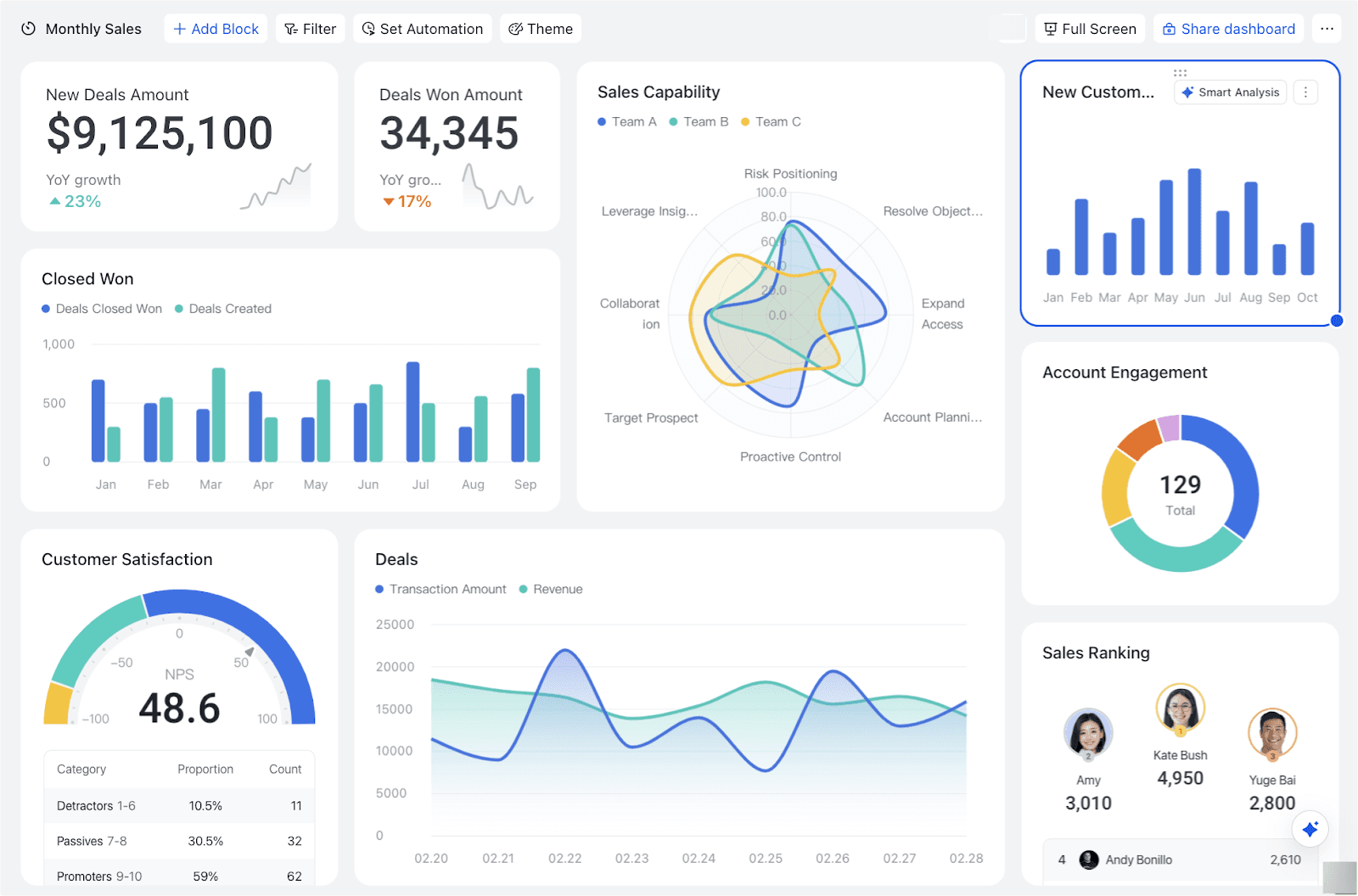
Zero-code business system creation:
Allows sales teams to build flexible systems using forms, advanced permissions, and automation.
Helps create lightweight CRM systems, order reporting structures, and sales tracking tools.
Solves traditional sales management and CRM software pain points like high costs, slow upgrades, and limited flexibility, making it easier to adapt to business changes.
Mobile-friendly reporting:
Simplifies the process of submitting sales reports on mobile devices.
Enables frontline salespeople to update and track sales information in real time, eliminating the need to compile reports at the end of the day.
Advanced permission control:
Offers granular permissions management to prevent issues like data overwrites, errors, and unauthorized access.
Ensures data security and segmentation, so team members only see the information relevant to them.
Automation and real-time updates:
Automates repetitive tasks like reminders, order reporting, and data summaries.
Pushes real-time updates on sales performance, making it easier for managers to track performance and make timely decisions.
Best for: Sales teams of all sizes that need a versatile, mobile-friendly, and highly collaborative platform for managing sales pipelines and team communication.
Pricing: Free plan available. Paid plans start at $12/user/month.
2. HubSpot CRM - Best for integration with HubSpot tools
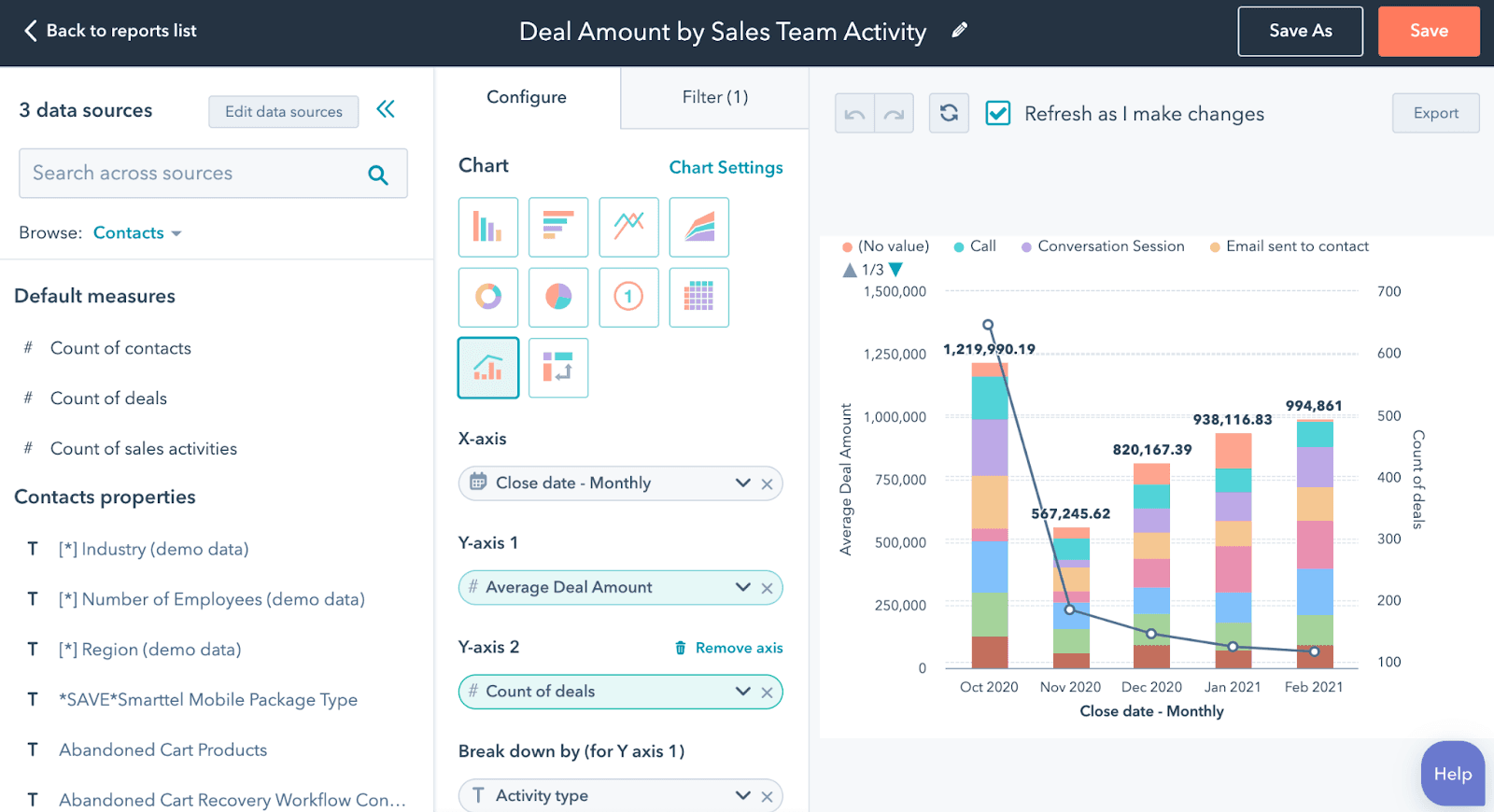
Image source: makewebbetter.com
HubSpot CRM remains a favorite among small businesses for its robust free plan and easy-to-use interface. Primarily used for its CRM software, you can also use HubSpot as a sales management tool. It offers the perfect balance between affordability and functionality, making it a top choice for beginners.
Key features:
Contact and lead management with a unified customer view.
Email tracking and templates for personalized communications.
Sales automation to streamline repetitive tasks.
Real-time analytics dashboard for tracking deals and performance.
Best for: Small to medium-sized businesses seeking affordable sales management tools.
Pricing: Free plan available. Paid plans start at $15/user/month.
3. Salesforce - Best for contract management and trusted sales tools
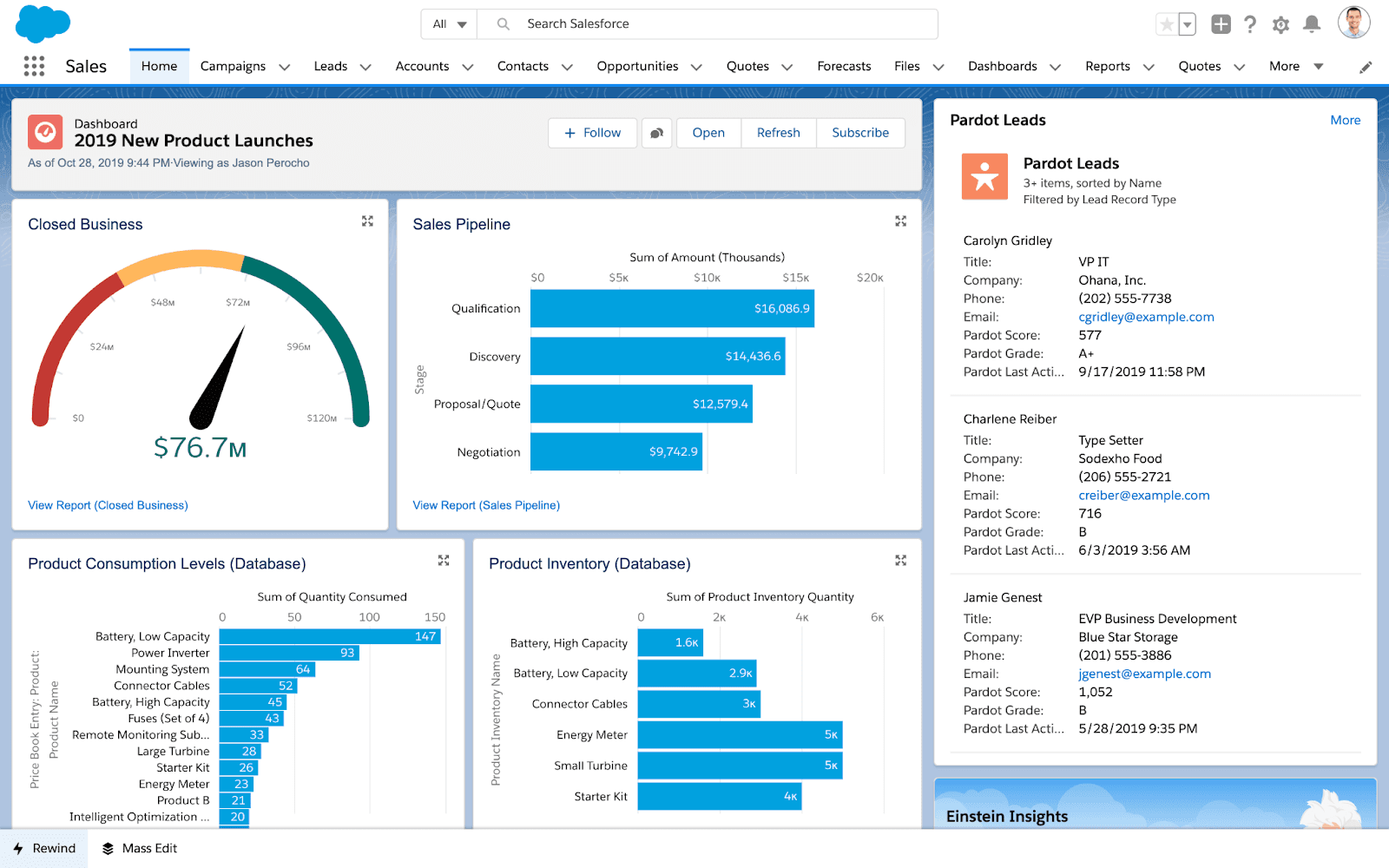
Image source: tech.co
When it comes to sales software, Salesforce is one of the most reputable tools on the market. It provides businesses not only a way to manage their customers but also their sales processes. Its AI-powered tools make it a leader in sales automation and predictive analytics. In addition, its contract management software makes it ideal if you need to create, negotiate, and approve sales contracts.
Key features:
Advanced forecasting and analytics powered by AI.
Highly customizable workflows to suit complex sales processes.
Integration with thousands of third-party tools.
Comprehensive reporting for large sales teams.
Salesforce contract management software is advanced and ideal for teams dealing with contracts.
Best for: Large enterprises with complex sales needing trusted sales software features.
Pricing: No free plan. Paid plans start at $25/user/month.
4. Zoho CRM - Best for customization and flexibility
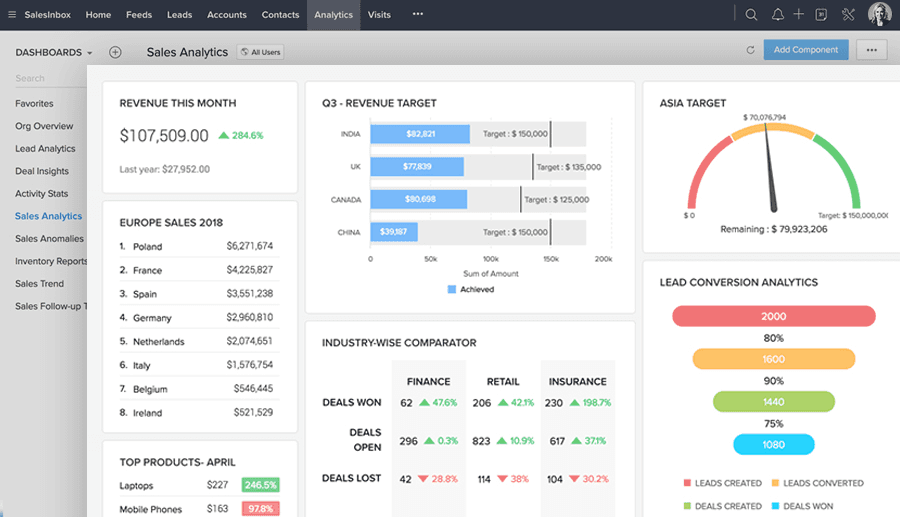
Image source: Zoho CRM
Zoho CRM is a cost-effective sales management tool offering a wide range of features, from lead scoring to pipeline tracking. Its flexibility makes it ideal for businesses in various industries.
Key features:
AI-powered sales assistant for smarter decision-making.
Customizable dashboards for real-time tracking of KPIs.
Integration with Zoho’s suite of productivity tools.
Affordable pricing for growing businesses.
Best for: Small to medium-sized businesses needing customization.
Pricing: Free plan available. Paid plans start at $14/user/month.
5. Monday.com - Best sales software for visualizing processes
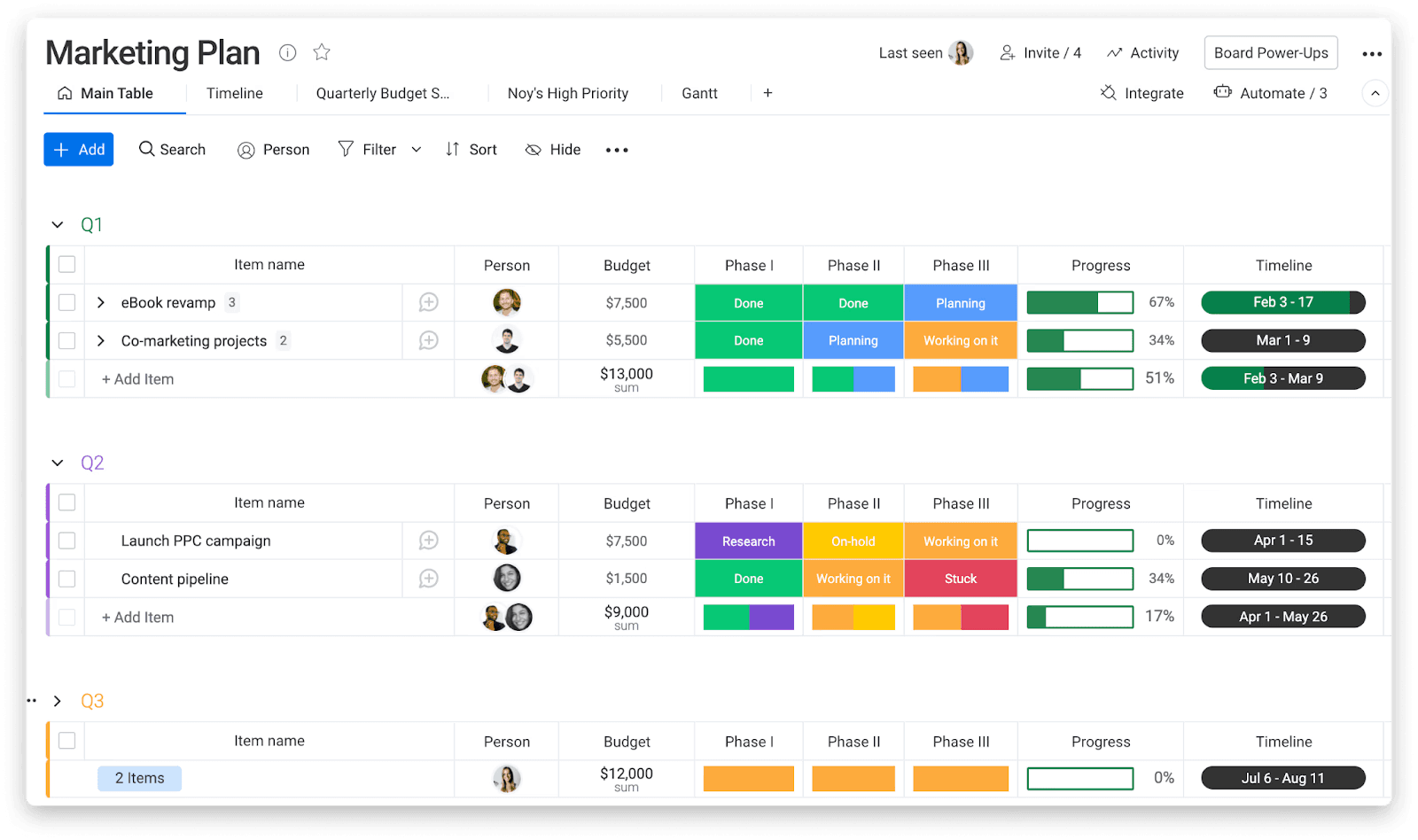
Image source: projectium.network
No sales software list would be complete without Monday. Monday.com combines project management and sales pipeline tracking in a visually intuitive platform. Its drag-and-drop interface makes it easy to use, even for non-technical teams.
Key features:
Customizable workflows and automated reminders.
Integration with tools like Slack, Gmail, and Google Workspace.
Visual pipeline tracking for better deal management.
Collaborative dashboards for team updates.
Best for: Teams that prefer a visually intuitive sales tool.
Pricing: Free plan available. Paid plans start at $8/user/month.
6. Pipedrive - Best for pipeline management and automation

Image source: www.getapp.com.au
Pipedrive is a sales software platform designed to simplify pipeline management. Its automation tools make it a favorite for teams looking to save time.
Key features:
Visual pipelines with drag-and-drop functionality.
Automation for follow-ups and repetitive tasks.
Sales forecasting and performance tracking.
Integration with email platforms and CRMs.
Best for: Sales teams focused on pipeline and process automation.
Pricing: No free plan. Paid plans start at $14/user/month.
7. Freshworks CRM - Best for CRM AI-powered sales tools
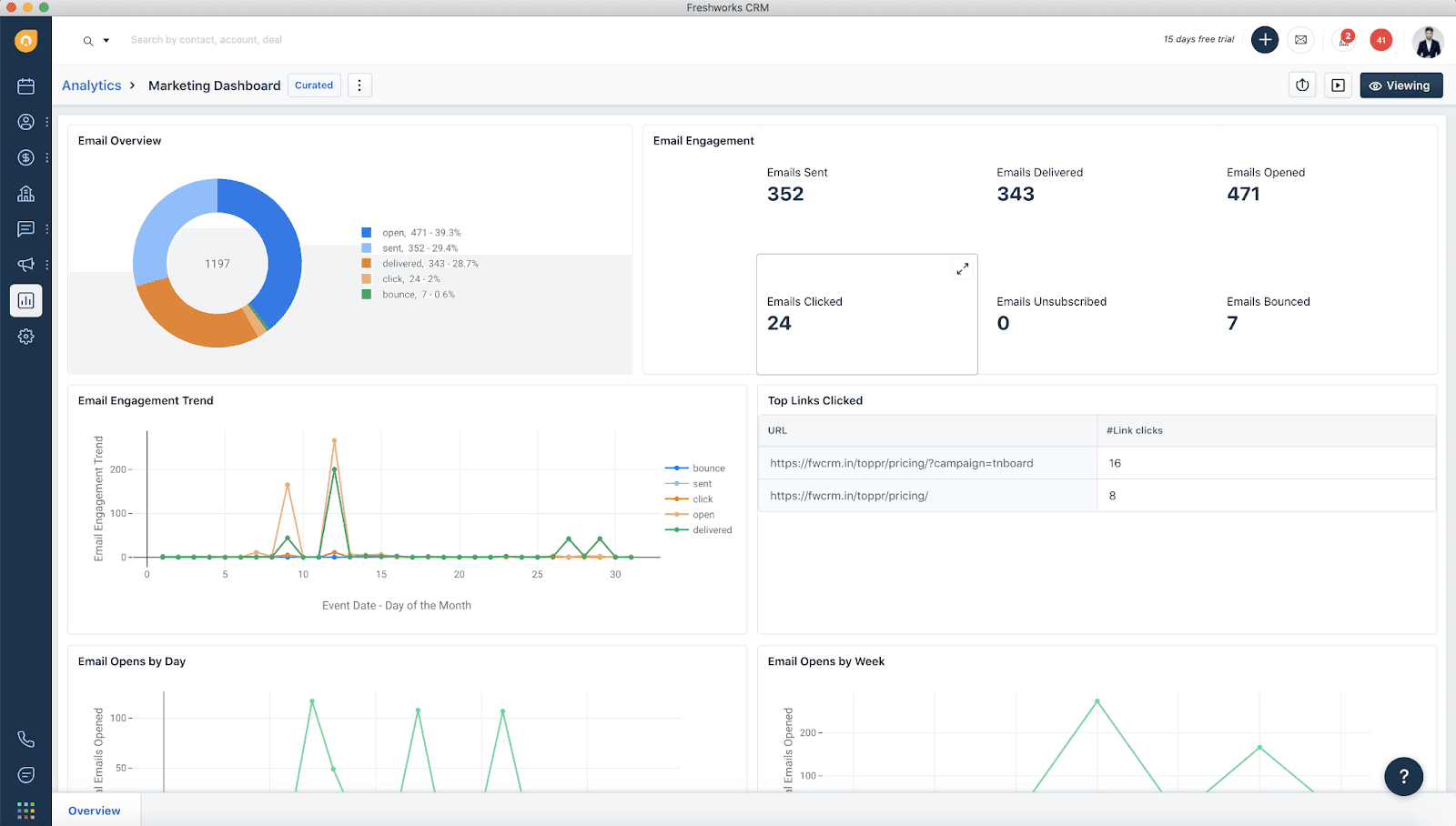
Image source: reviews.financesonline.com
Freshworks CRM combines ease of use with powerful AI sales tools. It’s designed to help teams close deals faster by providing actionable insights. Designed as a CRM software tool, it can also act as your sales management platform, helping to keep track of your sales workflows.
Key features:
AI-driven lead scoring to prioritize high-value opportunities.
Email tracking and personalized templates.
Customizable sales workflows.
Intuitive interface for a minimal learning curve.
Best for: Teams looking for AI-enhanced tools.
Pricing: Free plan available. Paid plans start at $9/user/month.
8. Nutshell - Best for simple and straightforward sales management
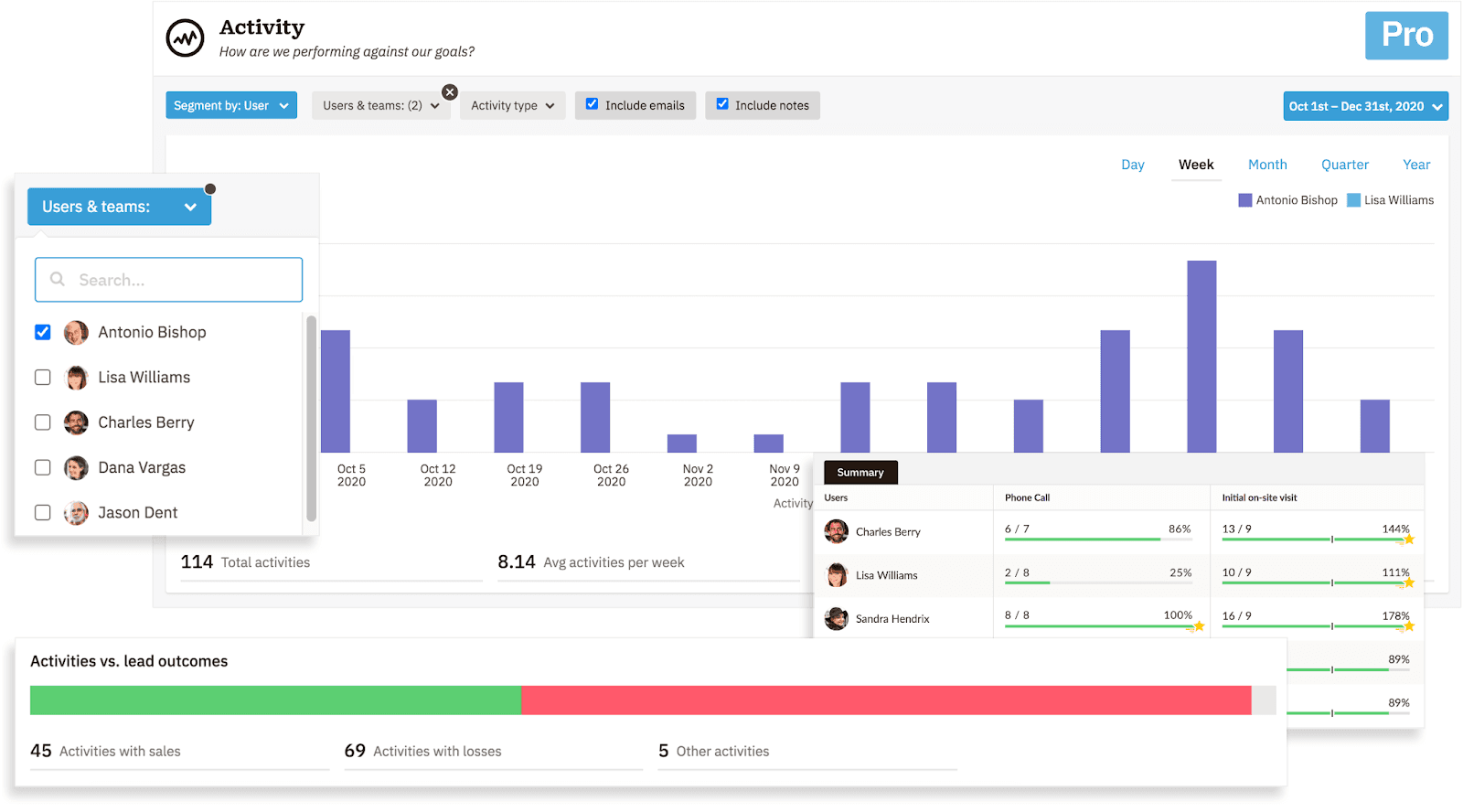
Image source: softwareadvice.com
Nutshell is a simple yet effective sales management tool tailored for small businesses. With its streamlined interface and core features, it’s an ideal choice for teams with straightforward sales processes.
Key features:
Contact and pipeline management.
Integration with email marketing tools like Mailchimp.
Detailed reporting and performance tracking.
Straightforward setup and usability.
Best for: Small teams needing a no-frills solution.
Pricing: No free plan. Paid plans start at $13/user/month.
9. Spotio - Best for field sales teams and frontline workers
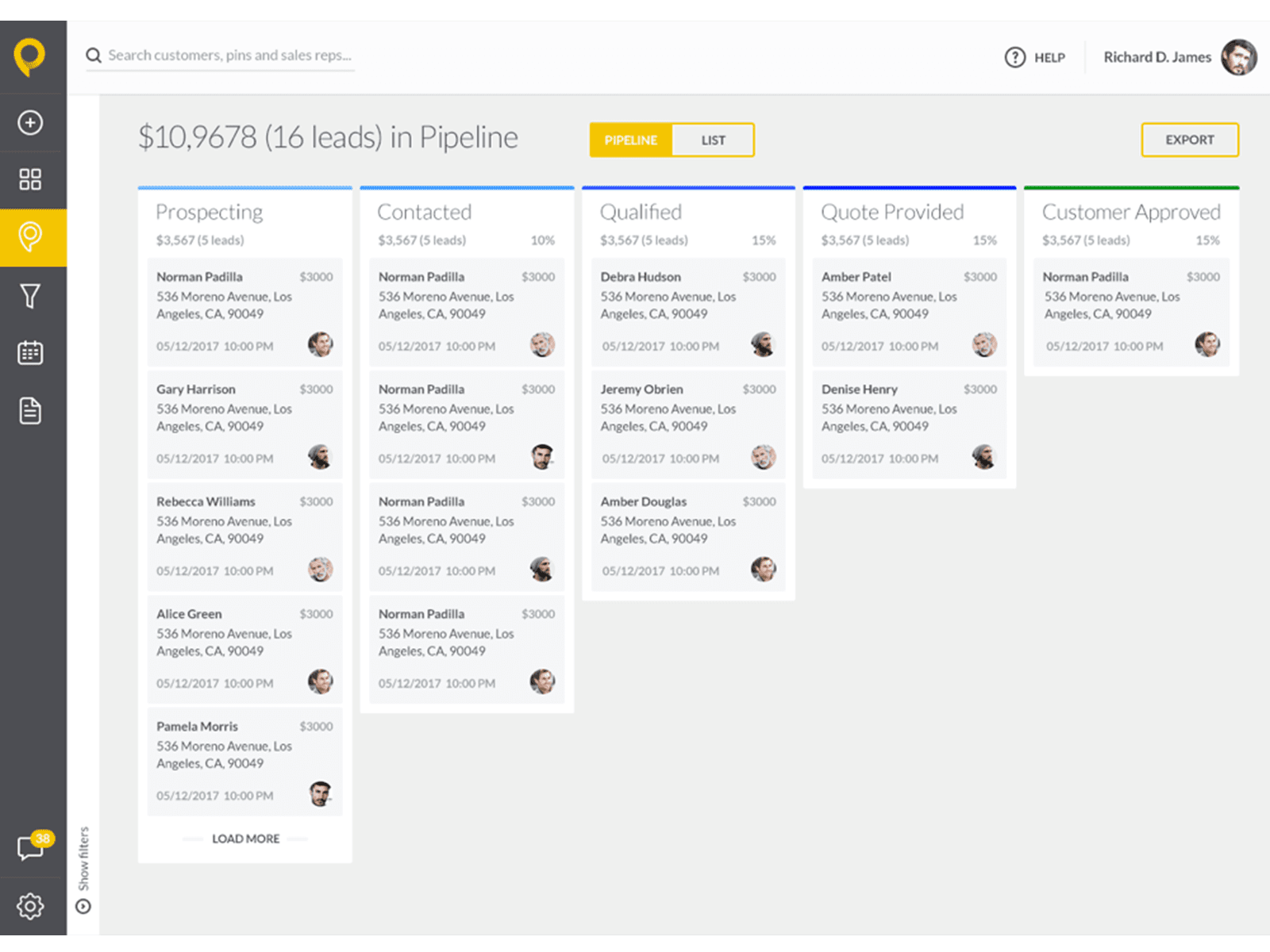
Image source: softwareadvice.com
Spotio caters to field sales teams with unique location-based features, making it a must-have for businesses reliant on door-to-door or territory-based sales.
Key features:
GPS tracking for field reps.
Territory management tools.
Real-time activity reporting.
Integration with CRMs for seamless data flow.
Best for: Field sales teams needing sales management tools.
Pricing: No free plan. Custom pricing is available based on team size.
10. Flowlu - Best for reporting and financial management tools
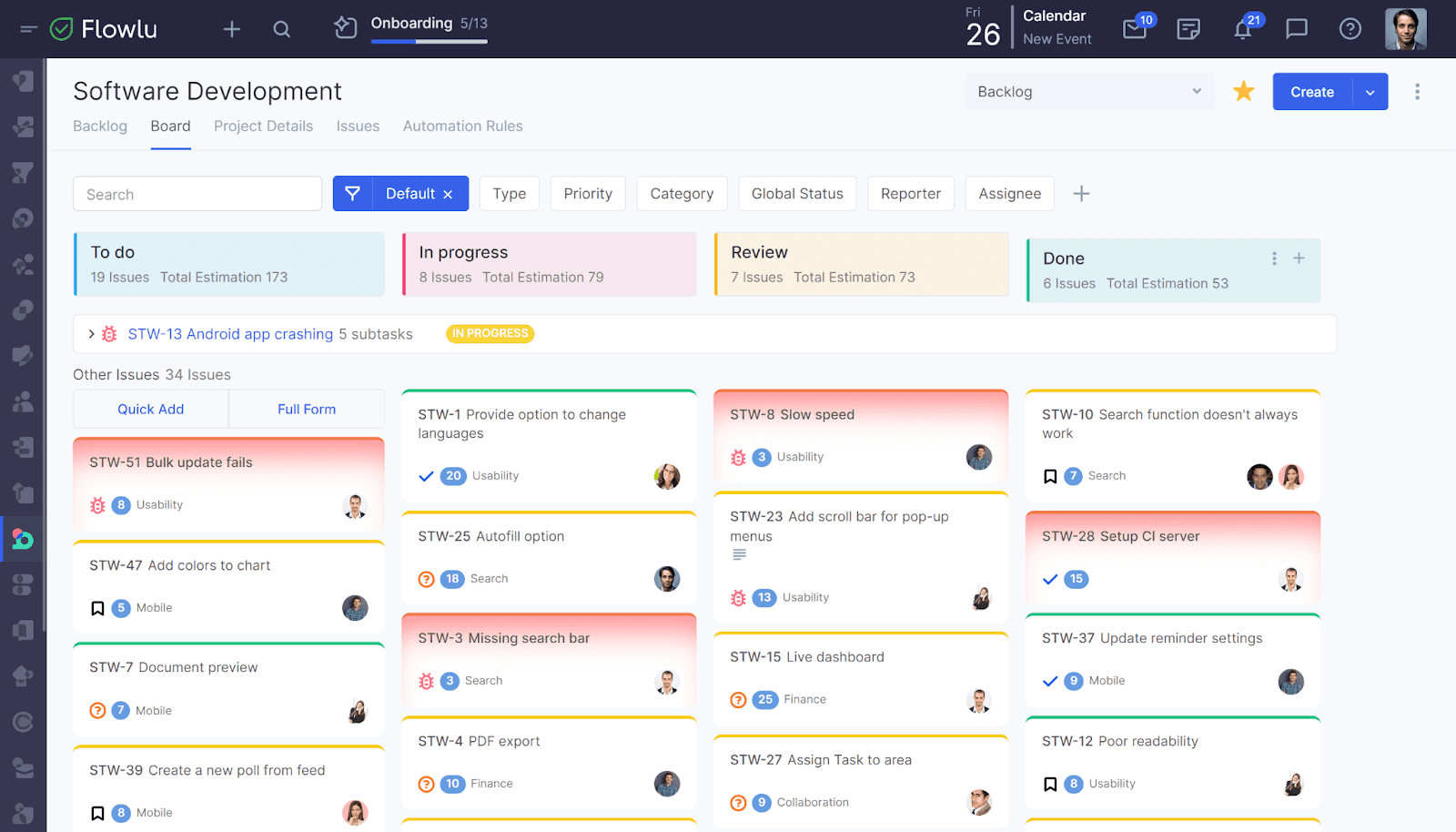
Image source: Flowlu
Flowlu stands out as a budget-friendly option that combines sales management software with project management tools, perfect for startups and small teams.
Key features:
Sales and project tracking in one platform.
Financial management tools for budgeting and invoicing.
Integration with third-party apps like Zapier.
Comprehensive reporting for better decision-making.
Best for: Startups and small teams.
Pricing: Free plan available. Paid plans start at $49 for 8 users per month.
Honorable mentions
While we’ve highlighted the top 10 sales management software options, several other tools deserve recognition for their unique features and capabilities. These honorable mentions may not have made the main list but are worth considering for your sales team's needs.
Salesflare

Image source: pcmag.com
Best feature: Automated lead detection & tracking
Best for: SMBs who sell B2B
Pricing: No free plan available. Paid plans start at $29/user/month.
Ambition

Image source: g2.com
Best feature: Gamification for sales performance
Best for: SMBs, startups, and remote sales teams
Pricing: No free plan available. Paid plans start at $19/user/month.
Copper

Image source: botpenguin.com
Best feature: Integrates seamlessly with Google Workspace (G Suite)
Best for: Email-focused sales teams
Pricing: No free plan available. Paid plans start at $9/user/month.
Forecastio

Image source: g2.com
Best feature: Accurate revenue forecasting
Best for: Sales teams focused on pipeline management
Pricing: No free plan available. Paid plans start at $119 for 2 users per month.
Outreach

Image source: smartreach.io
Best feature: Enhanced sales engagement
Best for: Teams aiming to improve prospect follow-ups
Pricing: No free plan. Custom pricing available.
How to choose the right sales management software for your team
Choosing the right sales management tool is crucial for optimizing your sales processes and enhancing team productivity. Here are some steps to guide you through the selection process:
1. Assess your needs
Begin by evaluating your team’s specific requirements. Consider the size of your sales team, the complexity of your sales process, and the features that will be most beneficial. Make a list of must-have functionalities to streamline your search.
2. Research available options
Review our list of the best sales management software options and do further research. Look for solutions that align with your needs, taking note of their key features, user reviews, and overall reputation in the industry.
3. Take advantage of free trials
Many software providers we’ve mentioned offer free plans or trials. Take advantage of these opportunities to test the software firsthand. Engaging with the platform will help you determine if it fits your workflow and is user-friendly.
4. Evaluate integration capabilities
Ensure that the sales management software can integrate smoothly with your existing tools, such as CRM systems, email platforms, and marketing automation software. This will save you from potential disruptions and enhance overall efficiency. If you're looking to streamline workflows and reduce third-party integration needs, consider an all-in-one solution instead.
5. Consider scalability
Select a solution that can grow with your business. Whether you're a startup, SME, or a larger enterprise, the software should accommodate your future needs without requiring significant changes.
6. Focus on user experience
User-friendliness is key. Look for software that is intuitive and easy to navigate. A steep learning curve can hinder adoption and productivity, so prioritize solutions that offer clear guidelines and support resources.
7. Seek feedback from your sales team
Involve your sales team in the selection process. Gather their input on the features they find valuable and their experiences with different tools. This collaborative approach will ensure that the chosen software meets the needs of those who will be using it daily.
8. Analyze costs
Finally, consider your budget. While it’s important to invest in quality software, ensure that the pricing aligns with your financial capabilities. Look for transparent pricing structures and be wary of hidden fees.
By following these steps, you can choose the right sales management software that enhances your sales strategy and supports your team's success.
Sales management software FAQs
What is the difference between CRM software and sales management software?
While CRM software focuses on managing customer relationships across various departments like marketing, support, and sales, sales management software is designed specifically to optimize the sales process. It includes tools for pipeline management, performance tracking, and sales automation, catering to the unique needs of sales teams.
What sales management tools are free to use?
Several sales management tools offer free plans, including HubSpot CRM, monday.com, Zoho CRM, and Lark. The right tool for you depends on your priorities. For instance, if integration capabilities are crucial, HubSpot CRM could be a great fit. On the other hand, if you're seeking an all-in-one solution to reduce reliance on third-party tools, Lark might be the better choice.
What is the best sales management software for small businesses?
The best sales management software for small businesses and startups is Lark. It offers an all-in-one platform for collaboration, task management, and CRM, making it easy for teams to manage sales and communicate in real time. With a free plan that includes 11 products, Lark is perfect for small teams looking for a cost-effective solution. For those seeking advanced features, the paid plan starts at just $12/user/month.
What are the differences between various types of sales management software?
Different types of sales management tools cater to specific needs:
Sales performance management software focuses on tracking and improving individual and team performance.
Sales contact management software helps centralize and manage customer details for better follow-ups and relationship building.
Project management software integrates task tracking and pipeline management, ideal for teams handling complex sales cycles.
Contract management software streamlines the creation, negotiation, and approval of contracts.
With Lark’s range of features, you can create a sales management system for any scenario, ensuring maximum efficiency and adaptability.
Choose the best sales management software
Sales teams in 2025 face unparalleled challenges, but with the right sales management tools, they can thrive. While all the tools on this list offer great features, Lark stands out for its unique ability to integrate sales pipeline management with team collaboration. Its all-in-one platform eliminates the need for multiple tools, saving time and improving efficiency.
Lark’s Base platform combines the flexibility of sales management software with powerful collaboration tools, offering an unmatched level of customization and accessibility. Unlike traditional sales management tools, which can be rigid and expensive, Lark’s no-code approach allows both small businesses and large enterprises to quickly adapt to changing needs without incurring high costs or delays.
Table of Contents
















